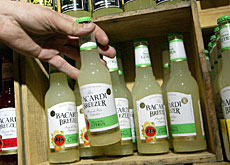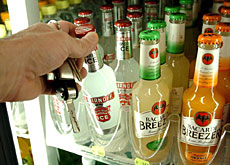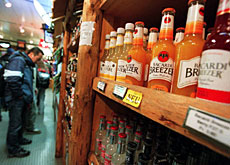Sales of alcopops fall as tax kicks in

Teenagers and young adults have been buying fewer alcopops since higher taxes on the designer drinks were introduced in Switzerland a year ago.
The fall in sales answers the concerns of parliament and alcohol abuse experts who feared the sweet tipples were leading unwary youngsters towards alcoholism.
The tax was introduced on February 1, 2004, increasing the amount of import duties on each bottle four times, and pushing the average price up from SFr2.30 ($1.93) to SFr4.10.
The aim was to persuade youngsters to give up drinking the beverages, which had become all the rage.
According to the Swiss Alcohol Board, just two million bottles were imported in 2000, around 39 million bottles crossed the border two years later, and 25 million in 2003.
Last year, 16 million bottles made their way to Switzerland, but around half of these were imported in January, with sellers stocking up before the new tax was imposed.
Falling sales
Distributors say the tax has had an adverse affect on sales.
“Sales dropped by half last year,” said Toni Schneider of Heineken. He added that the decrease was even more significant during the last quarter of 2004.
Coop, the country’s second biggest supermarket chain, has confirmed the trend. It believes that alcopops – a blend of spirits with soft drinks or fruit juice – have also lost some of their fashion status.
These results are satisfying for organisations such as the Institute for the Prevention of Alcohol and Drug Addiction, even if they have to admit that it won’t stop young people from drinking excessively.
“Alcopops have strong alcohol content, and their sweet taste helps youngsters get used to stiffer drinks,” said Institute spokeswoman Corine Kibora.
“If they choose to drink something less strong now, it’s much better.”
Circumventing the law
As alcopops sales slow, distributors have attempted to replace them with products with lower alcohol volume. A pre-mixed drink is only considered an alcopop if it contains more than 50 grams of sugar per litre.
For associations fighting alcohol abuse, the distributors’ response to falling sales does not come as a surprise.
“The makers of these drinks will always try to find a way of circumventing the law,” Kibora told swissinfo. “I don’t think suppliers are too worried about consumer health, despite all their statements otherwise.”
But so far, the new taste has not caught on. “Sales will continue to drop,” said Schneider.
According to the Swiss Alcohol Board, the failure of the new products to find a market is a sign of the success of the alcopops tax. “It has fulfilled its aim, to slow consumption by young people,” said Board spokesman Marc Huber.
Powdered alcopops
But distributors have not given up. In March, they are launching sales of powdered alcopops.
The powder is dissolved in water, and beer or sparkling wine is added to the mix. According to consumers who’ve tasted the new drinks, the danger comes from the fact that there is no real taste of alcohol.
Alcohol abuse specialists say they are not too concerned by this latest development.
“It’s more of a marketing ploy,” said Kibora. “They have only been available on the internet until now and are very expensive.”
This does not mean, however, that abuse experts are sleeping on the job.
“We are keeping an eye on new developments,” Kibora told swissinfo. “We are also working closely with the Alcohol Board to ensure that legislation keeps pace with the market.”
swissinfo with agencies
The Swiss consume on average nine litres of alcohol each per year.
50% of this alcohol is drunk as wine, 31% as beer, 1% as cider and 18% as spirits.
11% of the adult population downs half of the alcohol consumed in Switzerland, while nearly a quarter don’t drink at all.
The health of an estimated 300,000 Swiss is affected by alcohol.

In compliance with the JTI standards
More: SWI swissinfo.ch certified by the Journalism Trust Initiative


You can find an overview of ongoing debates with our journalists here. Please join us!
If you want to start a conversation about a topic raised in this article or want to report factual errors, email us at english@swissinfo.ch.